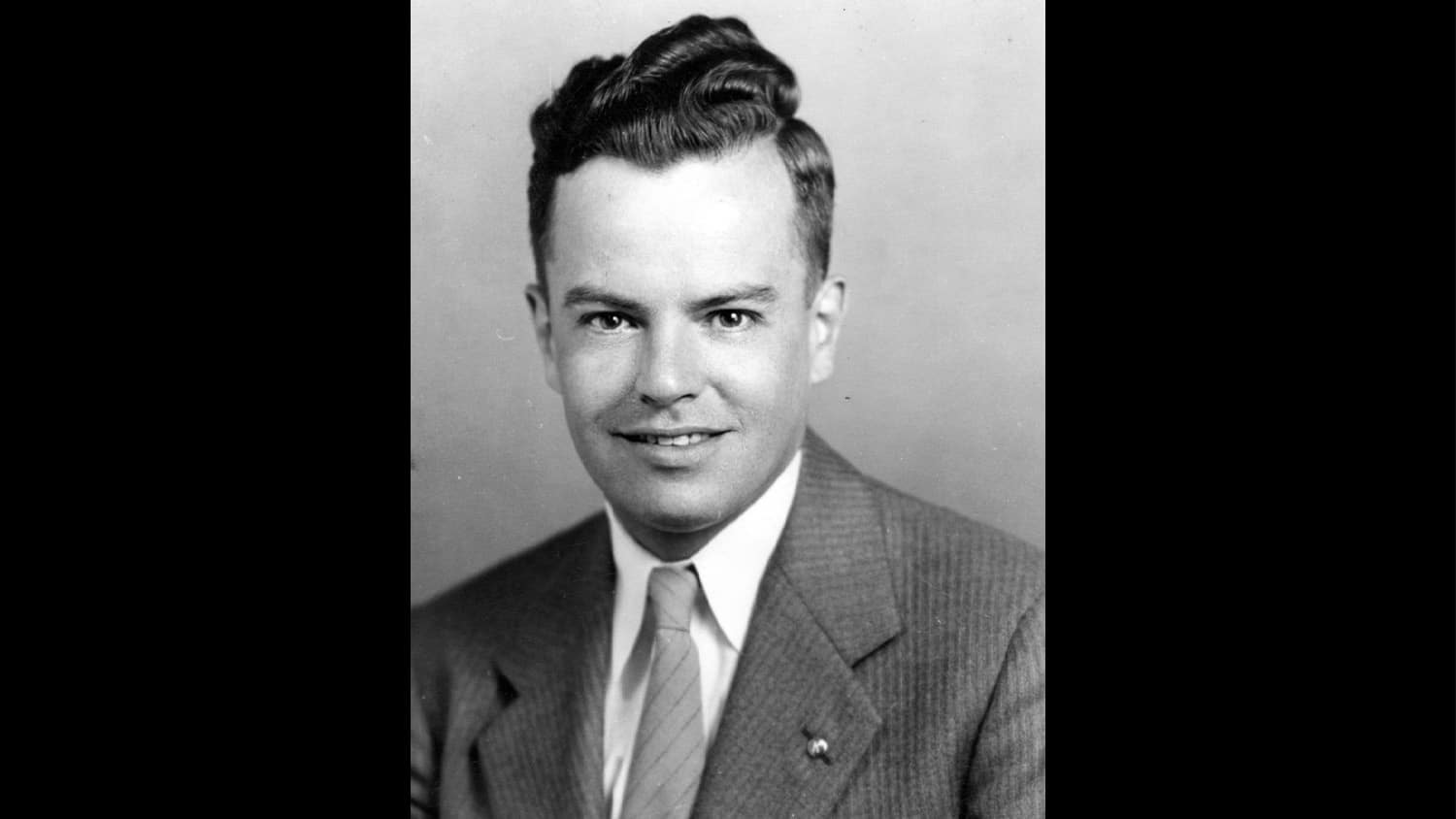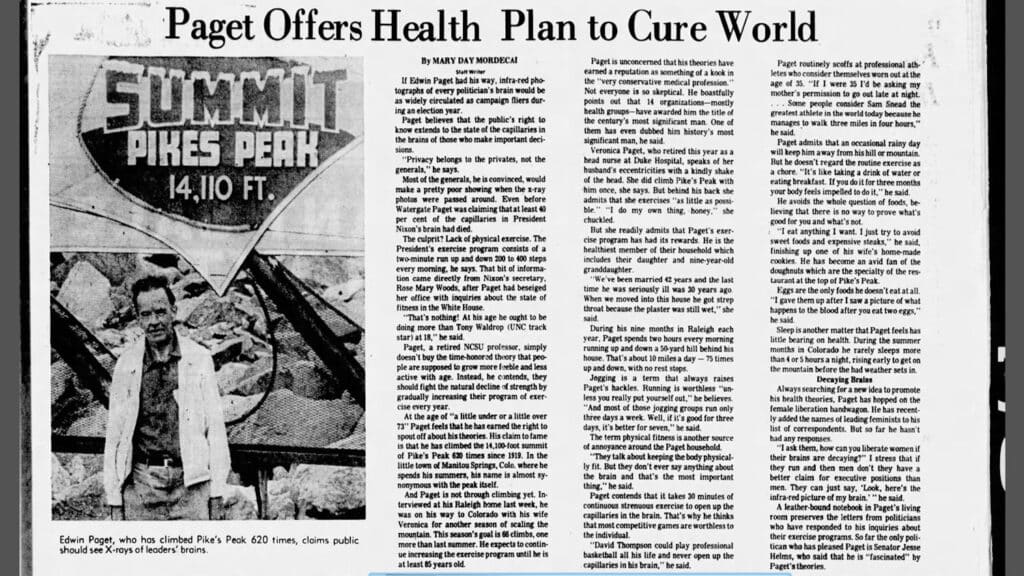‘History’s Most Significant Man,’ Remembered
Speech professor and director of forensics Edwin Paget made some outlandish claims and suggestions during his 86 years, during which he gave himself the title of “Modern Michelangelo” and “History’s Most Significant Man.” He also documented a record 985 hikes to the top of 14,110-foot Pikes Peak in Colorado.

Edwin Paget came up 54 years short reaching for what he long preached to be the ideal age — 140 years — of peak physical fitness for a dedicated athlete.
The late professor of speech and director of forensics in NC State’s College of Humanities and Social Sciences from 1929 to 1984 carried the banner of “History’s Most Significant Man,” given to him, he said, by an organization in the Research Triangle Park, with 77 other groups, clubs and businesses agreeing with it. He died at the age of 86 on July 11, 1989.
“I have no rivals [for that title],” he said, as quoted in his Raleigh News & Observer obituary. “Nobody else has effrontery enough to accept a title like that.”
Paget, a native of St. Louis who grew up in Chicago, was one of the more eccentric personalities to ever teach a class in Tompkins, Winston and the Link Building (now Caldwell Hall) or anywhere else on NC State’s campus. A valedictorian in speech at Northwestern University, Paget did graduate work in Pittsburgh and Wisconsin before landing a job as a teaching professor at NC State in 1929.
His basic philosophy of life, according to one of his former students, was that a man should strive for health, wealth and a beautiful wife. To acquire the latter, Paget said, the only thing to do was ask every beautiful woman you saw if she would marry you.
“Most would say ‘no,’ some may slap you, but there would inevitably be the one who said ‘yes,’” said Paget, who was married to his wife, Veronica, the former head of nursing at Duke University Hospital, for more than 57 years.
Despite his many years as an NC State institution, Paget had no time to do things slowly. He played “speed golf,” hitting the ball then sprinting to it for the next shot, with a goal of finishing a full round in under an hour.
He advocated for continuously played basketball, with all free throws taken at the end of regulation in order to speed up play.
He created the Baby Olympics for pre-toddling babies to begin a lifelong fitness journey.

He then created “Save Our Grandparents Week” after Colorado Gov. Richard Lamm suggested terminally ill elderly folk “have a duty to die and get out of the way…and let the other society, our kids, build a reasonable life.”
He collected infrared photographs of every living U.S. president’s brain to study what made them tick. Well, everyone except Richard Nixon, who wouldn’t cooperate. He did correspond regularly with infamous Nixon secretary Rose Mary Woods, who would often share the president’s workout regimen.
He lived in the days before federal laws prevented the release of an individual’s medical information and had no regard for hiding the health records of national leaders.
“Privacy belongs to the privates, not the generals,” he said in a 1974 interview.
Wouldn’t he have a field day with whichever candidate wins this November?
Students late to his classes were required to bring doughnuts for classmates the next day, a penalty not so severe back when fraternity, sorority and organizational fundraisers sold a dozen Krispy Kremes for $2 at either end of the Free Expression Tunnel.
Students giving a speech in class had to endure the distraction of Paget standing on a desk in the back of the class waving his arms, in the same manner that modern basketball fans at PNC Arena try to distract a free-throw shooter by waving arms and big heads on a stick.
Students gaining his favor were allowed to pick a candy bar out of a rusty coffee can and eat it in class.
He was widely known away from campus for scaling Pikes Peak in Colorado, his home away from Raleigh for decades. By his count, he hiked to the 14,110-foot summit 985 times during his lifetime, a record that has not been approached in the 35 years since his death. He once made the grueling hike four times in a 19-hour span.
Normally a 13-mile trek along the Barr Trail, Paget — as with everything in his life — took a different route for his three-and-a-half hour trips to the summit. Most of his ascents were 8.9 miles (with 7,800-feet elevation increase) along the tracks of the Pikes Peak Cog Railway, which he invariably rode back down to the cottage in Manitou Springs he rented every summer with his wife and daughter. He claimed to have permission from the railway to hike up the tracks.
985 trips to the top of Pikes Peak
2,632 total miles hiked
Once, to break the monotony, he carried a bottle of ocean water to the summit, poured it into a pie plate and held it over his head. Then he told the local newspaper that he was the first person to climb a 14,000-foot mountain under sea water.
In all, he hiked 2,632 miles up the mountain, the equivalent of 100 marathons.
While in Raleigh, he prepared for his Rocky Mountain hikes by running up and down a 50-yard hill in the Raleigh Rose Garden, just behind his house near the Raleigh Little Theatre, a minimum of 75 times a day. The path he wore in the grass was turned into a well-used staircase and mulch-covered walkway. When it rained, he ran up and down his basement stairs 315 times.
He planned to climb Pikes Peak for the 1,000th time on his 100th birthday, followed by a large brass band. Alas, he died at the tender age of 86, five years after his third — and final — retirement from NC State’s faculty. He made his 986th visit to the top of the mountain when his daughter secretly spread his ashes atop Pikes’ upper ridge.
Through the years, the avowed supporter of women’s liberation rights and a penpal of North Carolina Sen. Jesse Helms caught the attention of Sports Illustrated, United Press International, the Raleigh News & Observer and Technician for his achievements and antics.
Paget carried the mantle of “History’s Most Significant Man” proudly to his final resting place, even though few today ever knew he owned it.
This article is part of the Campus Characters series. In Campus Characters, we explore some of the people who, through the years, have given NC State’s campus a different spice and flair. If you’d like to suggest someone to profile, email Tim Peeler at tmpeeler@ncsu.edu.
- Categories:


